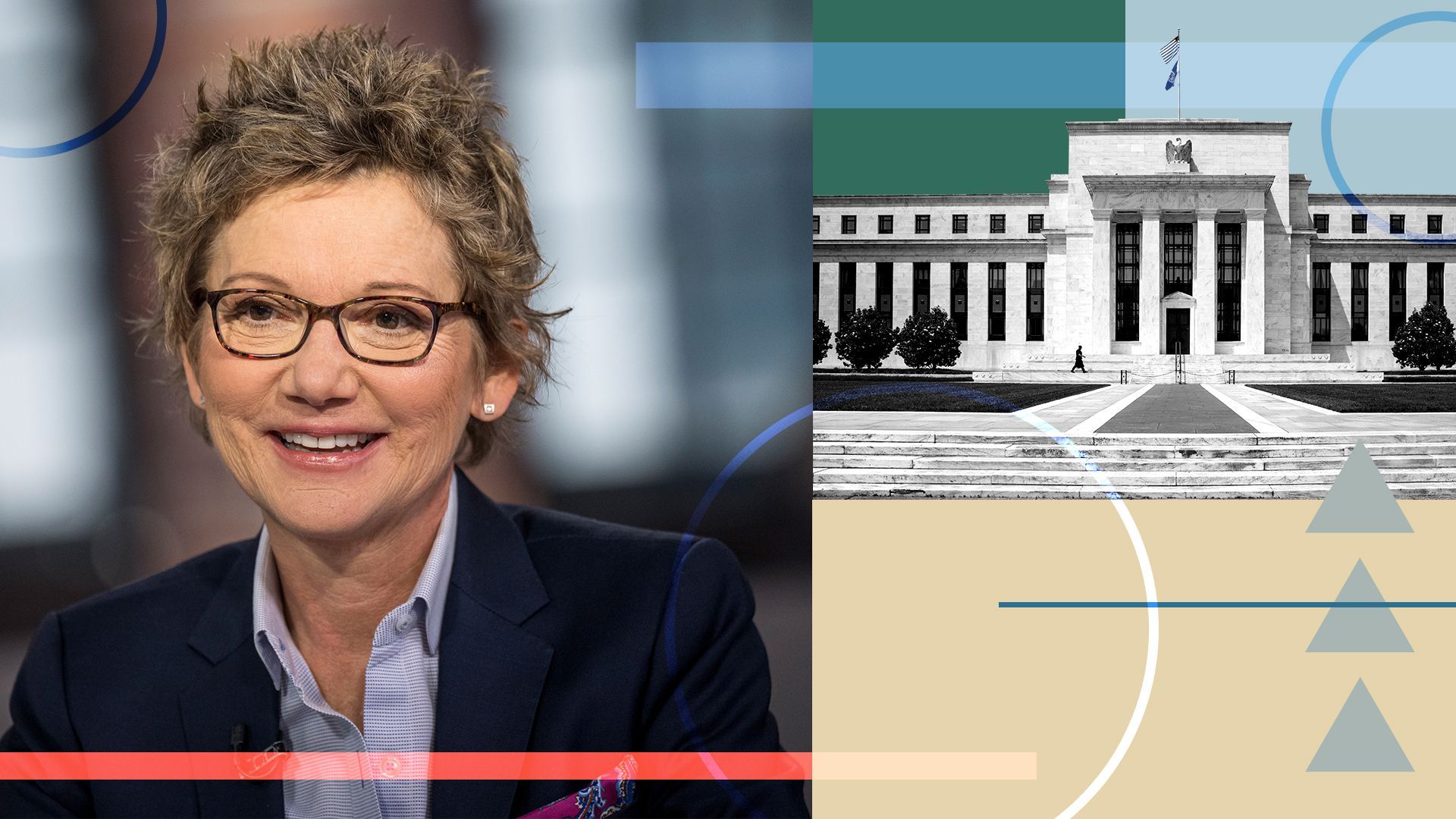SF Fed President Mary Daly on the crypto crash and more
Add Axios as your preferred source to
see more of our stories on Google.

Photo illustration: Shoshana Gordon/Axios. Photo: David Paul Morris/Bloomberg via Getty Images
On Thursday, the Axios Macro team spoke with Mary Daly, president of the Federal Reserve Bank of San Francisco, about a wide range of topics. Here are some lightly edited highlights from the interview.
On the interest rate path ahead and what might change her views on the need for rate increases:
- "My own views on policy… are that we need to get to something like the neutral rate of interest by the end of the year, which in my judgment would be to around the 3.1% range of a nominal Fed funds rate."
- "And so what would unwind the need to do that? Well, if there were some extraordinary, unexpected developments in the economy that pull inflation down rapidly, or [the] supply chain would repair or some other global shock that we had to deal with, but none of those things are happening" at the moment, she says.
On the latest inflation reading, showing a 6.3% rise in consumer prices over the past year:
- "The data on inflation are coming in more or less as expected. … My expectation was that we would be high for another several releases. And so this is just confirming that the data are coming in strong in a negative sense. They're coming in too high. And thus, we have to stay on our policy course if we're going to do our part to restore price stability."
On when the Fed might slow the pace of interest rate hikes:
- "I would say 75 [basis points] in July, and then you figure out what else needs to be done so that we can get to 3.1% by the end of the year. So that is likely to be some natural slowing of the pace of interest rate hikes in terms of the magnitude."
- "It's more about getting to where we need to be, and how much do we do that? It could be the case that we're very uncertain about how the economy will play out and we want to take 25 basis point increases at a time, but I don't feel that uncertainty is the pervasive thing happening today. I think that really is about next year."
On whether it might make sense to speed up the pace of shrinking the Fed's balance sheet in light of continued high inflation:
- "When we decided on [the pace of balance sheet reduction], one of the things that I really was focused on is, you want to pick a pace that you think is durable across a range of outcomes."
- "So the economy goes slower than you think, but the adjustments on interest rates go far quickly and the economy slows down more quickly. So it's slower. Will this pace still work? The other one is what if we have to do more, will the pace still work?"
- "So I feel this pace is a really good pace because it gives us that durability across a range of potential developments in the economy."
- "The funds rate is like our speed boat adjustment tool, and [the] balance sheet is like a tanker ship. So you want your tanker ship to be on a good course that's really robust to a variety of developments, and you want to make any fine-tuning of your rate path with your more nimble instrument, and that would be the funds rate and forward guidance," Daly argues.
On the widespread financial troubles among venture capital-backed tech firms and the crypto industry, and whether it might have broader economic significance:
- "What I'm hearing from my contacts — who are either in venture funds, or they're in companies funded by venture capitalists, or they have a crypto presence — is that this was a pretty rapid ride up to some levels that look like a little bit frothy to me, frankly, and not probably long-term sustainable. So corrections in those marketplaces are not surprising."
- "In terms of the real economy effects, I was doing a CEO roundtable in LA last week. And they all came to the same conclusion, which is they lost a lot of younger people to the idea that you could work a little bit in trading crypto, and so they quit their jobs. And now they're getting calls back saying, 'Well, probably the working thing is a good gig, and I want to invest in the diversified portfolio.'"
- "So the real economy seems to have two sides to it: There are layoffs, there's definitely layoffs, but these individuals are quickly able to find other jobs."
- "And some of the softer labor supply in the 25 to 35 group is now firming up a bit. People are coming back in in ways that I'm anecdotally hearing. Now we'll have to watch to see if it scales to actually seeing it in the aggregate data. But right now, I'm hearing it. And that's a positive sign for many of the firms here."
On the housing market:
- "Households are in very good shape from a budgetary perspective, and that means that the systemic risk from housing slowing is just not there."
- "The slowing I'm seeing so far is a positive development for the housing market. There are so many people who are priced out because of the unbridled price appreciation. Slowing that down a little bit and giving builders and others a little room to breathe, I think will allow some opportunities to create a more sustainable plan in the housing market, which we clearly need."

